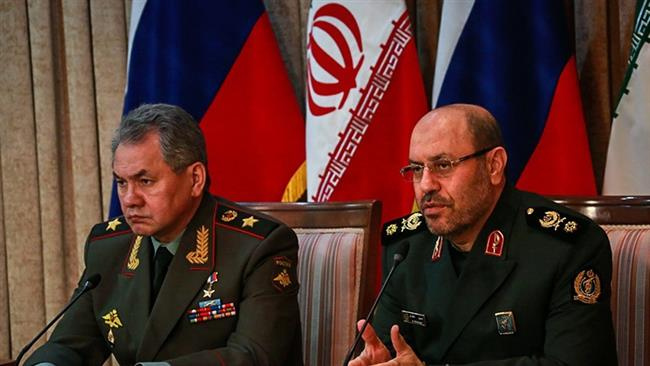Is Moscow planning to supplant Iranian influence in Syria? Interview with Mark Katz

(Iran's Defense Minister Hossein Dehqan (R) and Russian counterpart Sergey Shoigu at a press conference in Tehran, Iran, in January 2015. Source: Nasim)
Is Iran getting closer than ever to Russia? This was a question many asked in Tehran, mostly with a feeling of worry when one month ago Russian jet fighters took off Hamadan air base, in Western Iran, to attack anti-Assad rebels in Aleppo. Historical conflicts with Russia, from early 1800s onwards, have made many Iranians skeptical of the Russians, believing that the northern neighbor plays its Iran card skillfully and to the detriment of Tehran. Yet, in the recent years, the Islamic Republic has not waived its belief about effectiveness of its partnership with Moscow, despite the wax and wane. Zakiyeh Yazdanshenas has interviewed Mark N. Katz, professor of government and politics at the George Mason University Schar School of Policy and Government, and a non-resident fellow at The Arab Gulf States Institute in Washington to discuss the present and future of Tehran-Moscow relations.
IRD: The Syrian conflict has created an opportunity for Iran and Russia to strengthen their ties and consider military cooperation. What do you think about this cooperation? Do you view it as strategic or tactical?
MK: This is a question that is now being debated among Western analysts. Some believe that ever since Russia began its military intervention in Syria in September 2015, Russian-Iranian military cooperation went from being tactical to being strategic. Others see Russia and Iran as sharing immediate aims in Syria (protecting the Assad regime), but having diverging long-run interests (Iran sees Israel and Saudi Arabia as enemies, while Russia cooperates with Israel and would like to cooperate with Saudi Arabia). Not just Westerners, but Iranians and Russians themselves may not learn the ultimate answer to this question unless and until their common aims in Syria are achieved. It is then that we will see whether they then pursue similar or divergent aims.
IRD: What do you think of the recent truce negotiations between Russia and the United states? Do you think it could impact Iran- Russia alliance? Could Russia 'betray' Iran?
MK: The Russian-American negotiations for a cease-fire and common action against terrorists in Syria do not seem successful at the moment. In the U.S., many worry that such an agreement would serve to strengthen the Assad regime and weaken its opponents. There have been news reports, though, quoting both Israeli and Saudi officials that Russian officials have argued for them that they are better off with Russian forces being in Syria, because this can serve to restrain Iran and its Shi'a allies (such as Hezbollah). The belief that Russia could protect them from the "Iranian threat" could be useful not just with Israel and Saudi Arabia, but also with America. But at the same time that Moscow is doing this, it will also argue to Tehran that it is protecting Iran from the "American threat". More than anything, Moscow wants to prevent an improvement in Iranian-American relations, and the war in Syria is quite useful for this.
IRD: What do you think about Iranian-Russian divergence in Syria? We have heard a lot about their common goals. Where are the differences?
MK: There are indeed important divergences between Russia and Iran regarding Syria. The most basic is their overall approach to the rest of the region. While Iran regards Israel and Saudi Arabia as enemies (and these two regard Iran as an enemy too), Russia wants to have influence with all the states of the region: Iran, Turkey, Arab states, and Israel. What this means in Syria is that ultimately Moscow wants a settlement that mollifies Saudi Arabia and Turkey by including the Sunni Arabs, while Tehran fears that allowing the Syrian Sunnis a strong role in Damascus will position them to take over and weaken the pro-Iranian forces in Syria. Further, while one reason Iran is so determined to support the Assad regime is that it wants to make use of Syria to support Hezbollah against Israel, Moscow works well with Israel and does not want to Hezbollah to be in a position to seriously harm it.
IRD: For the first time since the 1979 Islamic Revolution Iran gave another country, i.e. Russia the right to conduct military operations from one of its air bases. But this did not last long. What do you think about the reasons and motivations for putting an early end to this cooperation?
MK: While the Iranian government had obviously agreed to allow Russian bombers to fly out of the Iranian air base, the abrupt end of this arrangement after the Russians publicized it shows just how sensitive Iranians are about Russia—which is not surprising, given the long history of Russian encroachments against Iran. Further, the end of the arrangement shows that the forces in Iran that made the agreement are apprehensive about criticism over this, and that Iranian public opinion may limit the degree to which Iran can cooperate with Russia. What this incident also shows is that despite their common aim of protecting the Assad regime in Syria, Iranians remain wary of long-term Russian goals.
IRD: How is Russian officials' perceptions about Iran's role in the region and especially in Syria? Do they accept Iran as a key player? Do you think they will consider Iran's interests at the end? Some Iranians call Russia unreliable based on historic experiences.
It is not unusual for Moscow to work with allies against a common enemy and then turn against those allies after the common enemy has been weakened or defeated. It seems highly likely that Moscow is even now planning for how it can supplant Iranian influence in Syria if the survival of the Assad regime, perhaps in a somewhat different form, can be assured. Iranian foreign policymakers, though, are not naïve, and so are undoubtedly preparing for this eventuality.

